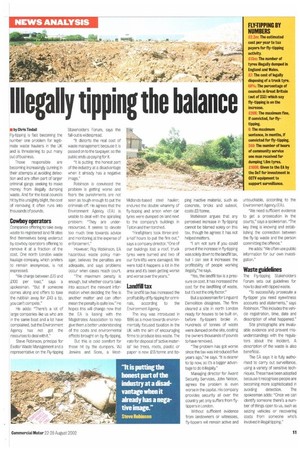Ill egally tipping the balance
Page 11

If you've noticed an error in this article please click here to report it so we can fix it.
IM by Chris Tindall
Fly-tipping is fast becoming the number one problem for legitimate waste hauliers in the UK and is threatening to put many out of business.
Those responsible are becoming increasingly cunning in their attempts at avoiding detection and are often part of larger criminal gangs seeking to make money from illegally dumping waste. And for the local councils hit by this unsightly blight, the cost of removing it often runs into thousands of pounds.
Cowboy operators
Companies offering to take away waste to registered land-fill sites find themselves being undercut by cowboy operators offering to remove it at a fraction of the cost. One north London waste haulage company, which prefers to remain anonymous, is not impressed.
"We charge between £70 and £100 per load," says a spokesman. 'But if someone comes along and offers to take the rubbish away for 140 a tip, you can't compete."
He adds: "There's a lot of large companies like us who are in the same boat and a lot have complained, but the Environment Agency has not got the resources to deal with it."
Steve Robinson, principal for Essllar Waste Management and a representative on the Fly-tipping Stakeholders Forum, says the fall-out is widespread.
"It distorts the real cost of waste management because it is passed on to the taxpayer, so the public ends up paying for it.
It is putting the honest part of the industry at a disadvantage when it already has a negative image."
Robinson is convinced the problem is getting worse and fears the punishments are not seen as tough enough to put the criminals off. He agrees that the Environment Agency (EA) is unable to deal with the spiralling problem: "They are underresourced. It seems to devote too much time towards advice and monitoring at the expense of enforcement."
However, Roy Watkinson, EA hazardous waste policy manager, believes the penalties are adequate, and says problems occur when cases reach court, "The maximum penalty is enough, but whether courts take into account the relevant information when deciding the fine is another matter and can often mean the penalty is quite low." He hopes this will change now that the EA is liaising with the Magistrates Association to help give them a better understanding of the costs and environmental effects brought on by fly-tipping.
But this is cold comfort for those hit by the dumpers. WJ Jenkins and Sons, a West Midlands-based steel haulier, endured the double whammy of fly-tipping and arson when car tyres were dumped on land next to the company's buildings in Tipton and then torched.
"Firefighters took three-anda-half hours to put the fire out," says a company director. "One of our buildings lost a roof, truck tyres were burned and two of our fork-lifts were damaged. We were told it happens a lot in the area and it's been getting worse and worse over the years."
Landfi tax
The landfill tax has increased the profitability of fly-tipping for criminals, according to the Environment Agency
The levy was introduced in 1996 as a move towards environmentally focused taxation in the UK with the aim of encouraging firms to produce less waste. The rate for disposal of 'active material' like trees, roots, plastic or paper is now 213/tonne and tip
ping inactive material, such as concrete, bricks and subsoil, costs £2/tonne.
Watkinson argues that any perceived increase in fly-tipping cannot be blamed solely on this tax, though he agrees it has not helped matters.
"I am not sure if you could prove if the increase in fly-tipping was solely down to the landfill tax, but I can see it increases the profitability of people working illegally," he says.
"Yes, the landfill tax is a pressure on cost. It has increased the cost for the landfilling of waste, but it's not the only factor."
But a spokesman for Linguard Demolition disagrees. The firm cleared a site in north London ready for houses to be built on, before fly-tippers broke in. Hundreds of tonnes of waste were dumped on the site, costing the owners thousands of pounds to have removed.
"The problem has got worse since the tax was introduced five years ago," he says. "It is dearer to tip now, so ifs a bigger advantage to do it illegally."
Managing director for Award Security Services, John Nelson, agrees the problem is even worse in the capital. His company provides security all over the country yet only suffers from flytippers in London.
Without sufficient evidence from landowners or witnesses, fly-tippers will remain active and untouchable, according to the Environment Agency (EA).
'We need sufficient evidence to get a prosecution in the courts," says a spokesman. "The key thing is knowing and establishing the connection between the fly-tip waste and the person committing the offence."
He adds: "We often use public information for our own investigation,"
Waste guidelines
The Fly-tipping Stakeholders Forum sets out guidelines for howto deal with tipped waste.
"To successfully prosecute a fly-tipper you need eyewitness accounts and statements," says Robinson. "This includes the vehicle registration, time, date and description of what happened."
Site photographs are invaluable evidence and prevent misunderstandings with the regulators about the incident A description of the waste is also beneficial.
The EA says it is fully authorised to carry out surveillance, using a variety of sensitive techniques. These have been adopted because it recognises people are becoming more sophisticated in avoiding detection. The spokesman adds: "Once we can identify someone there's a number of things open to us, such as seizing vehicles or recovering costs from someone who's involved in illegal tipping."
















































































































































